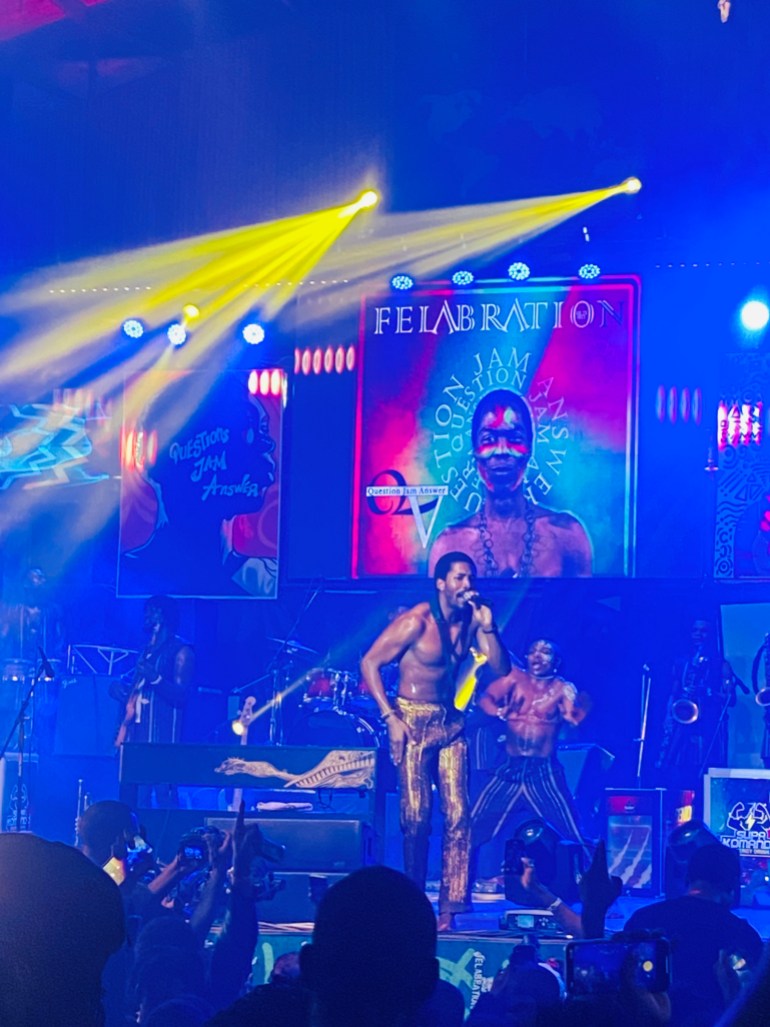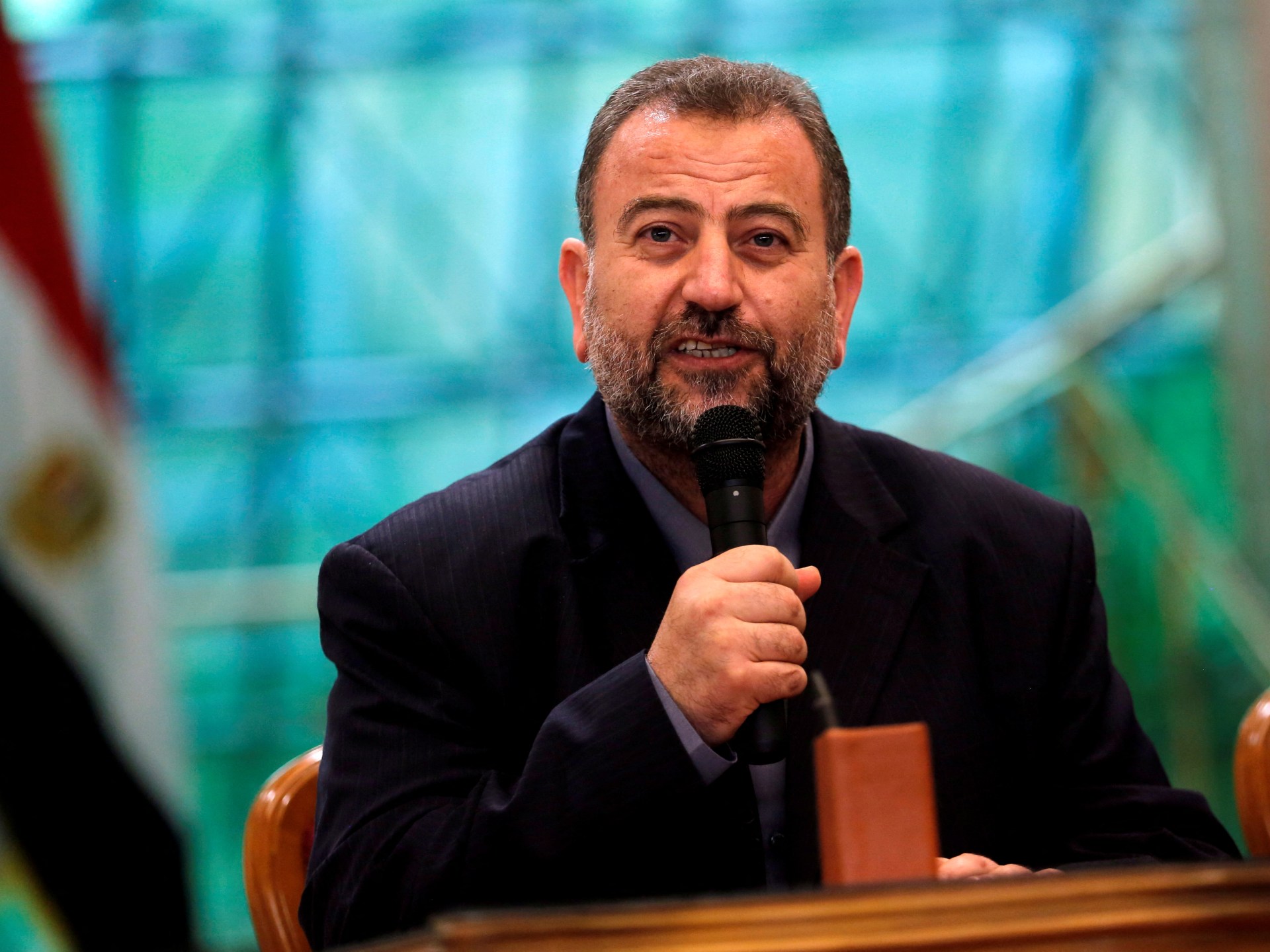Lagos, Nigeria — Last Wednesday, Nigerian rapper CDQ pranced onto the stage at a Lagos bar as hundreds of people threw their hands in the air and sang as he performed risqué lines from his discography.
As the people swayed to the loud music, vendors wandered through the crowd hawking snacks and alcohol. Outside the venue, even more food vendors were selling as frustrated drivers honked loudly to passersby, bumping shoulders as they snaked in and out of the concert.
It was the third day of Felabration, a weeklong music festival held from October 9 – 15 in honour of Fela Kuti, the pioneer of Afrobeat, a horn-driven genre influenced by jazz and highlife sounds. The concerts, usually free and televised from the New Afrika Shrine in Lagos, feature a mix of recognisable and upcoming artists from Nigeria and across the world.
Since its first edition in 1998, thousands of fans have thronged the venue yearly to partake in the festivities. This year, Sade White, a fashion entrepreneur in her late forties, was among them, dressed in a yellow shirt with Kuti’s face emblazoned on the front.
The concert she says, is not only a celebration of the artist’s legacy but a cause to reflect on the condition of everyday people, for whom he sang in his lifetime. “Fela’s music still resonates with us even today because a lot of the issues he sang about then are still relevant today,” she said.
Until his death in August 1997, Kuti criticised successive military governments for corruption, human rights abuses and bad leadership.
Most of the regimes brutalised or jailed him and his relatives; he racked up more than 200 arrests even as his mother – popular educator and suffragist Olufunmilayo Ransome-Kuti – died after complications resulting from being thrown down from the second floor of a building by soldiers.
Even power has barely changed hands from yesterday’s men: two of the five leaders Nigeria has had in that period – Olusegun Obasanjo and Muhammadu Buhari – were characters Kuti heavily criticised.
White is adamant that those problems of decades ago still exist today, decades after Kuti’s death 26 years ago and the return of democracy to Nigeria – in 1999.
“Nigeria is still suffering and smiling,” she said.
 Made Kuti, musician and grandson of Fela Kuti, performs at Felabration on October 13, 2023 [Pelumi Salako/Al Jazeera]
Made Kuti, musician and grandson of Fela Kuti, performs at Felabration on October 13, 2023 [Pelumi Salako/Al Jazeera]
An unchanging situation
More than half of the country lives on less than $2 daily and the economy has continued to nosedive due to years of raging inflation. Reforms introduced by current president Bola Tinubu have also reduced’ people’s disposable cash.
Corruption, which Kuti sang about in classics like International Thief Thief and Authority Stealing, remains rampant; at least two members of the current presidential cabinet have been mired in controversies in the past.
Human rights abuses are also common, despite the return to democracy. This year, the festival happened about a week before the third anniversary of Nigerian soldiers opening fire on unarmed youths at an anti-police brutality protest. At least 12 people died and dozens were severely injured.
“It is funny because when you think about Felabration is this month and the #EndSARS memorial is just a few days away. When you think about that whole experience, what is so different?” asked Aibee Adeoye, executive vice president of music at Chocolate City, a Lagos-based record label. “We still have a lot of the leaders from the past still stuck in government.”
Analysts say the issues raised in Kuti’s music still apply to today’s Nigeria because of a continued lack of accountability.
Joachim MacEbong, a governance analyst at Lagos-based Stears, cites as examples, songs like Unknown Soldiers and Army Arrangement, released in 1979 and 1984 respectively.
“Many of his songs are still very relevant in today’s society,” he told Al Jazeera. “Something like Unknown Soldier and Army Arrangement for example …the same way the soldier is unknown and doesn’t have any name and someone is killed by a stray bullet, for example, is the same way people are still corrupt.”
 A man carries empty petrol containers outside the NNPC mega petrol station in Abuja, Nigeria on May 25, 2015 [Afolabi Sotunde/Reuters]
A man carries empty petrol containers outside the NNPC mega petrol station in Abuja, Nigeria on May 25, 2015 [Afolabi Sotunde/Reuters]
‘Closer to the root’
Now in its 25th year, Felabration is one of the biggest music festivals on the continent and its appeal has spread to a younger crowd, including some fans who were not born when Kuti was alive.
Abiodun Magic, a staffer of a Nigerian telecommunications company, has attended three editions and says the festival has now become a communal gathering for him and his friends.
“It is our own celebration for the community where we come together and have fun. This is one opportunity where you get to feel closer to the root [of contemporary Nigerian music],” he said, heading back into the hall through wafts of marijuana smoke. “And it is completely free.”
Fela’s family continues his legacy of activism and music; his sons Seun (who inherited his band) and Femi, and grandson Made Kuti, all world-famous instrumentalists, sing across continents. They play a style similar to Kuti’s and interrogate similar socially conscious themes.
That legacy is also somewhat present in Afrobeats, arguably Nigeria’s biggest current export, which was spawned from Kuti’s Afrobeat. Some of Nigeria’s biggest artists like Wizkid and Burna Boy, both Grammy Award winners whose songs have repeatedly charted globally, continue to draw influence from him and sample his music.
Industry experts say some of these themes have continued, even if there has been a decline in the practice of speaking truth to power and a deviation to more hedonistic themes.
“The music [of today’s artists] is representing their experience as Nigerian youths and some are more expressive than others,” said Adeoye. “They are not challenging in the way that Fela did. But the heart of it is still representing the experiences of the average Nigerian.”
But for Stears’ MacEbong, the continuous relevance of themes in Kuti’s music to Nigeria’s current economic and political situation does not bode well for Nigeria and is evidence of a lack of progress in Africa’s largest democracy – and economy.
“I am hoping for a day when Fela’s music is not quite as relevant simply because the Nigerian society is a lot better,” he said.

 Movie
Movie 6 months ago
135
6 months ago
135 






![Presidents Day Weekend Car Sales [2021 Edition] Presidents Day Weekend Car Sales [2021 Edition]](https://www.findthebestcarprice.com/wp-content/uploads/Presidents-Day-Weekend-car-sales.jpg)



 English (United States)
English (United States)